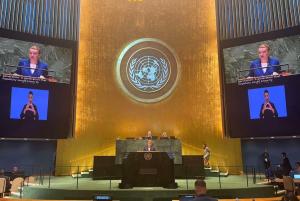Addressing the Plenary of the Summit of the Future during the UN General Assembly, UNECE Executive Secretary Tatiana Molcean noted that with its strong normative footprint, UNECE is fully dedicated to leveraging and adapting its tools, expertise, and partnerships to reinvigorate the implementation of SDGs across multiple areas, including climate action, through the decarbonization of inland transport, the energy transition, and transboundary water management.
The adoption of the Pact for the Future is a pivotal moment in the global journey towards a sustainable, peaceful, and resilient future. UNECE’s norms, standards and conventions can help UN member States to implement multiple actions contained in the Pact, especially those related to supporting multilevel and inclusive governance, tackling the most pressing environmental challenges, providing affordable housing and energy to all, and building intergenerational equity.
UNECE is committed to ensuring that the Pact for the Future takes an inclusive approach – actions must involve people of all ages, communities, and local authorities. To that end, the upcoming 4th Forum of Mayors “Cities Summit of the Future,” convened by UNECE, will gather mayors in Geneva to provide their input and perspectives for the implementation of the Pact.
Youth-led initiatives, including those of adolescent girls and young women, are essential to advancing all multilateral goals. UNECE is already facilitating the inclusion of youth perspectives into major regional deliberations. A key area of work – Education for Sustainable Development (ESD) – aims to equip youth with the knowledge and skills to build a more sustainable and inclusive future. Investing in ESD now means creating leaders who will put sustainability at the core of future decisions and prioritize environmental and social wellbeing over economic or political gains, the UNECE Executive Secretary emphasized.
During the Summit of the Future Action Days, and together with other UN Regional Commissions, UNECE presented a joint policy brief on intergenerational relations, which highlights the need to integrate the lens of intergenerational solidarity, justice and equity into global policy discussions to ensure a forward-looking delivery of the Pact. This is of particular importance in the context of increasing longevity and population ageing – an area in which UNECE actively promotes regional cooperation, policy dialogue and experience exchange between member States through its Standing Working Group on Ageing.
When it comes to climate action, UNECE provides many practical tools to support countries’ climate change mitigation and adaptation efforts, and to leverage climate finance.
In New York, the Executive Secretary signed a Memorandum of Understanding with ESCAP and the UN Multi-Partner Trust Fund Office to establish the Trust Fund of the UN Special Programme for the Economies of Central Asia (SPECA). This Fund will enable more impactful cooperation amongst countries in the sub-region on all the activities of the programme, including energy, environmental protection, trade, transport, digitalization, and many more.
At the side-event of the General Assembly on Advancing the Global Road Safety Agenda towards 2030, organized in the lead up to the 4th Global Ministerial Conference for Road Safety to be held in Morocco in February 2025, Ms. Molcean recalled the key role that the UN international legal instruments on road safety, developed at UNECE, play in supporting countries in their journey towards safer roads and vehicles.


